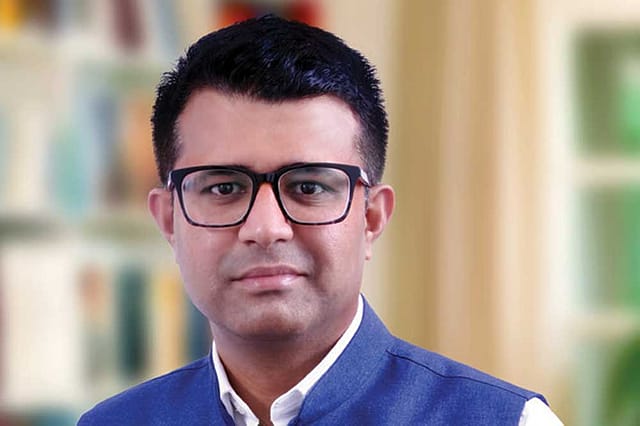Jindal Global Business School (JGBS)

How would you explain the current defining trends vis-à-vis business schools' functioning and approach?
One of the most defining trends in business education today is learning to adapt our functioning and approach to what industries are demanding from our graduates—it's not just about equipping students with specific knowledge and skills for entry-level roles anymore. Industries now prioritise graduates who understand why certain knowledge is valuable and how to apply it flexibly across diverse roles and organisational contexts. Jindal Global Business School (JGBS) is at the forefront of this evolution. Our research active faculty members, coupled with around 800 industry guest lectures a year, by speakers from companies like Deloitte and PwC; and 310+ international partnerships for various study abroad programmes, provide an ecosystem for our students to connect theory to practise. This, coupled with 180+ full-time faculty at JGBS from top Indian and foreign institutions (IITs, IIMs, and IoEs) and 285+ years of their collective industry experience from leading firms, reflect our commitment to a high-quality learning environment designed to cultivate adaptable, future-ready leaders.
Has placement puzzle emerged as a new challenge?
The "placement puzzle" isn't a new challenge, but a signal that business schools need to evolve. While connecting graduates with jobs has always been crucial, today's employers are less focused on a narrow skillset and more on adaptability, critical thinking, and ethical awareness—especially in the wake of recent crises. This signifies a move away from solely placement-based assessments of a business school's effectiveness, as companies are demanding a more nuanced profile, expecting adaptability, career-long learning, and ethical conduct across various roles and contexts, rather than simply skills tied to a specific entry-level role.
Do you feel this challenge is momentary or it will have long term implications? What kind of strategies are being adopted to deal with it?
The shifts we're seeing in the placement landscape aren't temporary; they reflect the evolving nature of education itself, particularly for business schools. As long as industries and consumer needs change, so will the skills and qualities that companies seek in graduates. Business schools must adapt their strategies accordingly. Right now, the future of work demands adaptable and ethically minded leaders who can tackle unforeseen challenges. At JGBS, we view this not as a hurdle but as an opportunity to continually redefine how we educate our students. Our curriculum comprises over 1300 core and elective management courses in a year, as well as over 500 non-management elective courses from across multiple disciplines offered by the other 11 schools at JGU. Our students develop a global outlook through Study Abroad Programs grounded in international partnerships with over 100 partner universities (such as the University of Liverpool, the University of Sydney, and Nottingham Trent University) situated in 30+ countries. Industry engagement is embedded in every course through industry guest lectures, which feature experts from leading consulting, FMCG, and tech firms such as KPMG, Capgemini, Gartner, BHEL, ICICI Bank, and Amazon. Our cutting-edge research is aligned with UN SDGs and tackles pressing issues like sustainability and ethical leadership, ensuring our curriculum remains relevant and forward-thinking.
How is the growing prominence of digital tools influencing curriculum changes in management studies?
The rise of digital tools is definitely reshaping management education. We're seeing a shift from simply teaching about technology to actively integrating digital tools and technologies like AI, Python, and data visualisation (e.g., Tableau) into the curriculum across programs. This emphasis is less about adding "digital literacy" courses as stand-alone subjects and more about enhancing the existing courses with the ability to harness these technologies to analyse business challenges, solve complex problems, and model outcomes, with demonstrable business examples directly incorporated into learning. The result: graduates proficient in both analysis and practical application—essential skills in the digital economy.
Is hybrid model still being in play even for those who are running full fledged campuses and well defined offline courses?
JGBS runs offline as well as online degree programmes, and while there is parity in terms of the effort required from learners to succeed in both formats, the imagination is quite different. While the offline programmes allow for an unforgettable campus experience both inside and outside the classrooms and opportunities for face-to-face interactions with professors and classmates, the online degree programmes offer affordability, accessibility, and flexibility, making it possible for learners from a wide variety of backgrounds to benefit from world-class JGBS degree programmes.
Do you think the alumni's role has become increasingly important given the changing dynamics of business and economy?
Alumni networks are vital for honouring and innovating our legacy. They bridge our graduates' classroom learning to the realities of the professional world and also offer insights into emerging industry trends. This creates opportunities for mentoring, industry connections, and collaborative ventures. JGBS has a proud lineage of alumni who are located across diverse industries. To provide our current students with practical pathways for nurturing meaningful relationships with these alumni and to ultimately translate it to successful outcomes, JGU has a dedicated Alumni Relations department.
JGBS prioritises topical and impactful research and innovation, demonstrated by our faculty's extensive publication record in top-tier journals like those in the FT-50 and ABDC categories. This research also shapes our curriculum, ensuring it reflects current industry needs and trends. A key differentiator is our integration of crucial social science disciplines (e.g., philosophy, sociology) directly into our core curriculum, something unique for Indian business schools. Further, real-world applications are deeply embedded, including topical business case studies. The 1,500+ internships annually, including a mandatory social internship component, connect classroom learning with tangible, impactful experience. This active engagement, coupled with ongoing research and case studies analysing contemporary issues (e.g., ESG considerations and environmental impact), provides students with a robust understanding of and opportunity to contribute to socio-economic change.
(A marketing initiative by Open Avenues)